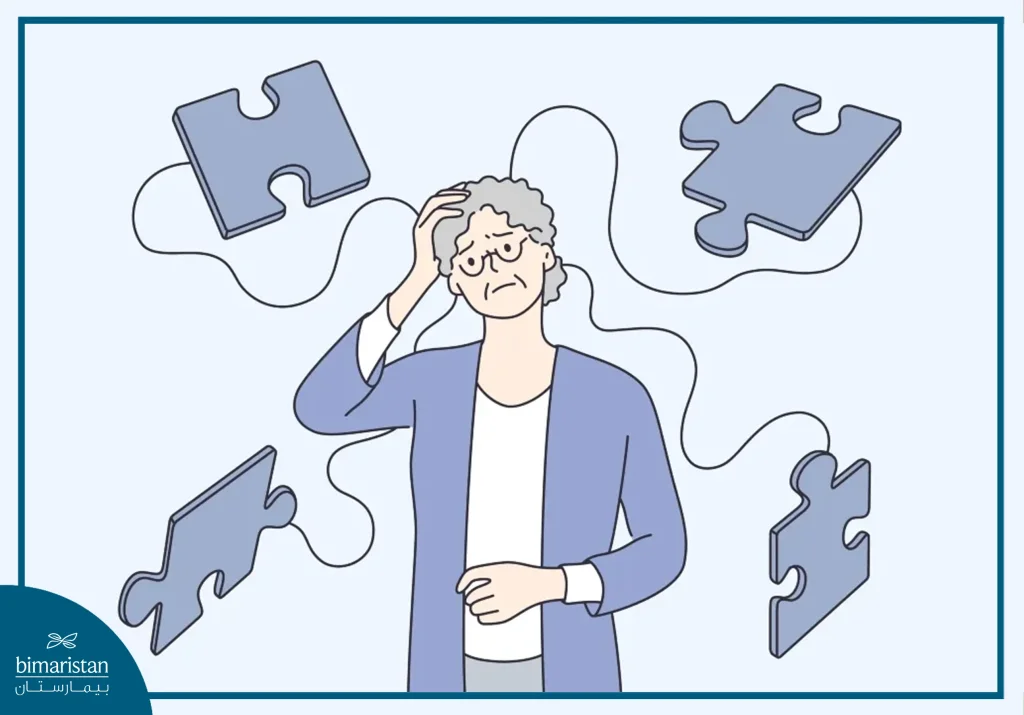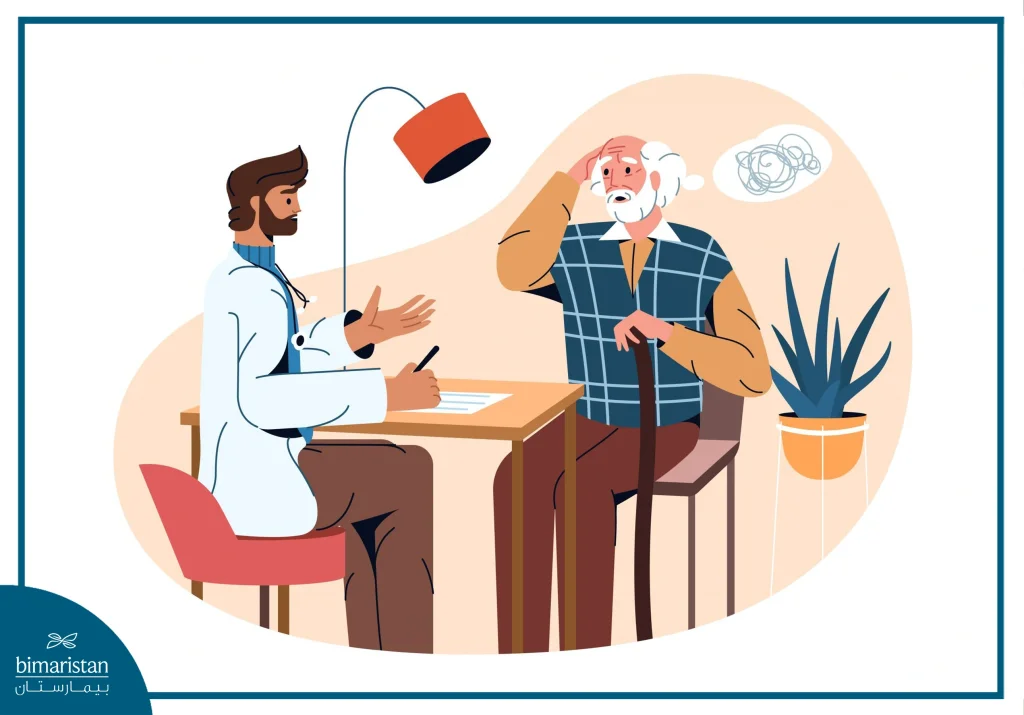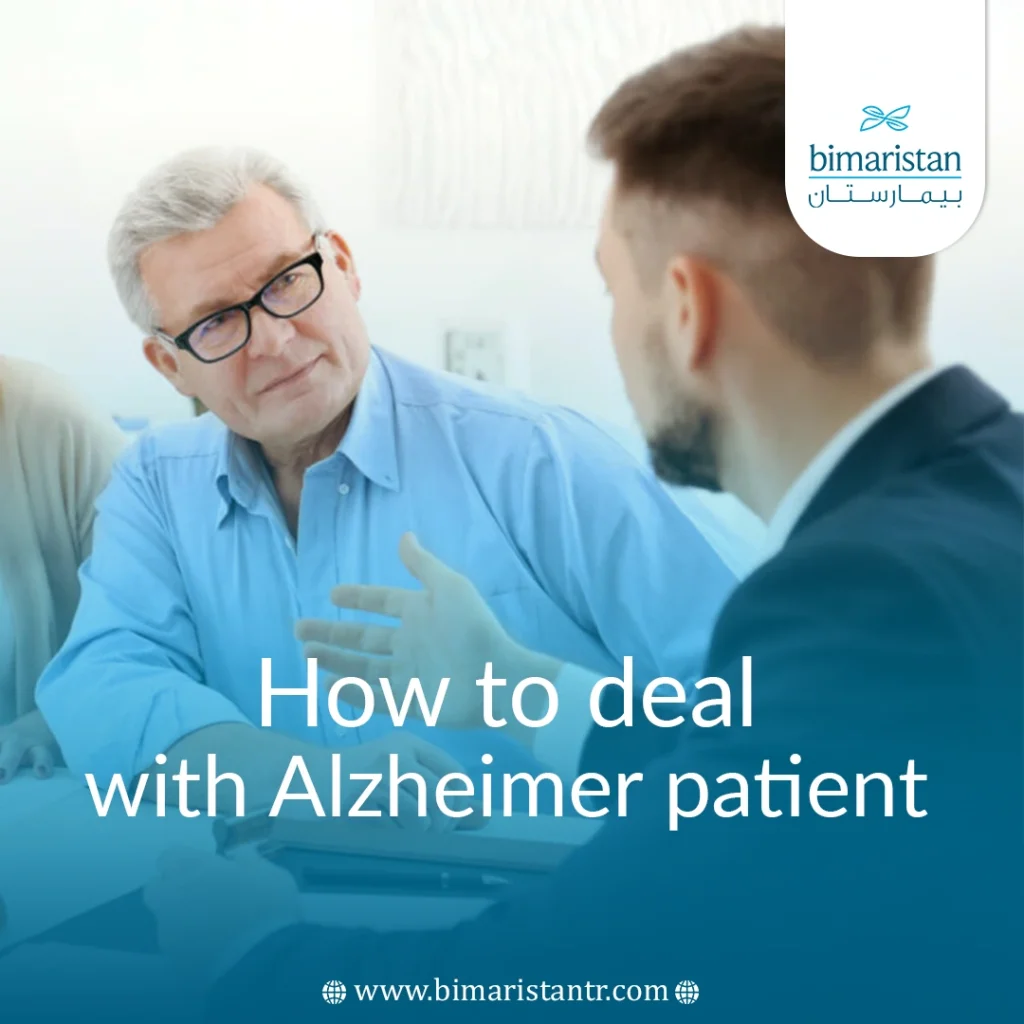Alzheimer’s patients suffer from the loss of their ability to remember; you may talk to them, and in seconds, they don’t remember the conversation or even remember who you are. Do you know how to deal with Alzheimer’s patients?
If you are caring for someone with Alzheimer’s disease, you need to know and learn how to deal with Alzheimer’s patients; you may find that the person in front of you suddenly does not remember you and may be afraid of you; understand the correct way to deal with them will help them participate in performing their daily tasks.
The severity and stage of Alzheimer’s disease will determine how to deal with it, so we will first familiarize ourselves with the stages that patients go through.
Stages of Alzheimer’s disease
Alzheimer’s disease is divided into seven stages, with each of the seven stages of Alzheimer’s having more severe symptoms than the last:
| Some early symptoms, such as mild memory loss and forgetfulness. | First stage |
| Mild mental deterioration, such as lack of concentration and memory impairment, most commonly noticed by those close to the patient | Second stage |
| Symptoms of the disease are still mild and consist of mild memory loss and lack of concentration, which affects the patient’s ability to perform daily tasks efficiently. | Third stage |
| Symptoms of the disease begin to invade the patient’s life, such as severe forgetfulness and difficulty swallowing, and this is where the patient needs help. | Fourth stage |
| Symptoms of the disease begin to invade the patient’s life, such as severe forgetfulness and difficulty swallowing, and this is where the patient needs help | Fifth stage |
| This is the most serious stage of the disease, as the patient loses the ability to express words, forgets people, and is completely dependent on outside help. | Sixth stage |
| Mild mental deterioration, such as lack of concentration and memory impairment, most commonly noticed by those close to the patient. | Seventh stage |
Read more about: Alzheimer’s neurodegenerative disease causes and symptoms.
The seven stages of Alzheimer’s disease that we mentioned above can be divided again according to the severity of the disease into early and late stages of Alzheimer’s disease, each of which has its own correct rules on how to deal with Alzheimer patients.
How to deal with Alzheimer patients in the early stages
Alzheimer’s disease in the early stages
In the early stages of Alzheimer’s disease, the patient’s behavior may be largely normal, he can drive, work, and participate in various life activities, only a slight difference may occur, and it may not affect him much.
In the early stages of Alzheimer’s disease, the most disturbing thing for the patient is his fear of the progression of the disease, and he needs the support of those close to him, such as family and close friends, to provide psychological support, supporting him and understanding his fears is the first thing that must be provided to the patient.
There are some things the patient needs help with:
- Helping him remember names or other words
- Save appointments
- Take him to familiar places and visit people close to him
- Help him manage his finances
- Follow up on his medications
- Organization of his life
- Follow his movement; he may forget where he’s going
How do you care for an Alzheimer’s patient in the early stages?
Here are the top tips to help patients in the early stages:
- Encourage him to exercise, as it improves his psyche a lot
- Follow a healthy diet and balanced meals that are rich in vegetables and low in fat
- Share activities with others
- Keep him away from distressing situations that mentally exhaust him, as he may not remember some things and feel frustrated
- Engage in activities that help you relax and regulate sleep

How to deal with a late-stage Alzheimer’s patient
Late-stage Alzheimer’s disease
Late-stage Alzheimer’s patients suffer from:
- Difficulty eating and swallowing
- Difficulty walking and needs help, and may end up not being able to walk
- Can’t take care of his or her own needs and always needs a companion
- Prone to infections, especially pneumonia
How do you care for a late-stage Alzheimer’s patient?
How to deal with Alzheimer patients in late stages? At this stage, the patient cannot fully care for themselves and will rely on you for daily tasks like feeding and hygiene. Caring for them is similar to tending to a child who is unaware of life’s complexities. Despite this, late-stage Alzheimer’s patients may still respond to emotions, certain familiar smells, and other sensory stimuli.
It can calm the behavior of the Alzheimer’s patient and may reduce the suffering of the Alzheimer’s patient’s companion:
- Looking at old photos with him and reading books that meant something to him
- If he has a favorite music, try playing it for him
- Sitting with him in beautiful places outside, especially his favorites
- Massage his skin with his favorite scents

Caring for a late-stage Alzheimer’s patient
Seeking treatment for Alzheimer’s neurodegenerative disease may not be enough to maintain the physical and mental health of the Alzheimer’s patient. Still, the Alzheimer’s patient requires special additional care to prevent diseases, so when dealing with a late-stage Alzheimer’s patient, you should pay attention to the following things:
Food
Alzheimer’s patients in the late stages may forget that they are hungry or lose their appetite. Lack of activity and movement reduces the person’s need for food. The Alzheimer’s patient’s companion should pay attention to this and set a specific meal schedule. With the help of the patient’s doctor, the companion should learn about the patient’s diet and make special meals from it.
Late-stage Alzheimer’s patients may find it difficult to swallow food, so choose soft and easy meals for them, such as soups, easy-to-swallow gelatinous foods, juices, etc. The patient may also forget to swallow or chew their food, so always try to keep an eye on them and remind them. When feeding an Alzheimer’s patient, make sure to sit them upright to help them digest the food.
Alzheimer’s patients may forget to drink water, may not be able to express their need for water, or may not even realize that they are thirsty. Keep this in mind and make sure to offer them fluids and water at frequent and regular times throughout the day so that they do not become dehydrated.
Alzheimer’s hygiene care
Alzheimer’s patients in the late stages have difficulty using the toilet, and incontinence is very common at this stage. You will need to accompany the patient and guide him when using the toilet. You should also make a schedule of toilet times per day because he may not be able to express it.
Infection and pneumonia
The inability to move in the late stages of Alzheimer’s makes the person more susceptible to infections; you have to know how to deal with the Alzheimer’s patient in a correct way to minimize the infection, as follows:
- Maintain good oral and dental hygiene to reduce the risk of bacteria that cause pneumonia
- Immediate wound treatment
- Alzheimer’s patients should get flu shots because it can progress to pneumonia
- Understand his pain and illness
A late-stage Alzheimer’s patient may not be able to express how they feel. Still, you may find some signs that help you know whether they are in pain or not, such as swelling of a part of the body, skin discoloration, and pale skin, all this in addition to anxiety, screaming, and little or too much sleep.
Suppose you are willing to be a companion for an Alzheimer’s patient. In that case, you must understand him well, understand his disease and the stage he has reached, and before knowing how to deal with an Alzheimer’s patient, you must prepare yourself psychologically for this responsibility.
Sources:
- Alzheimer’s Association (Early-Stage Caregiving)
- Alzheimer’s Association (Late-Stage Caregiving)
- Brain Research Center

